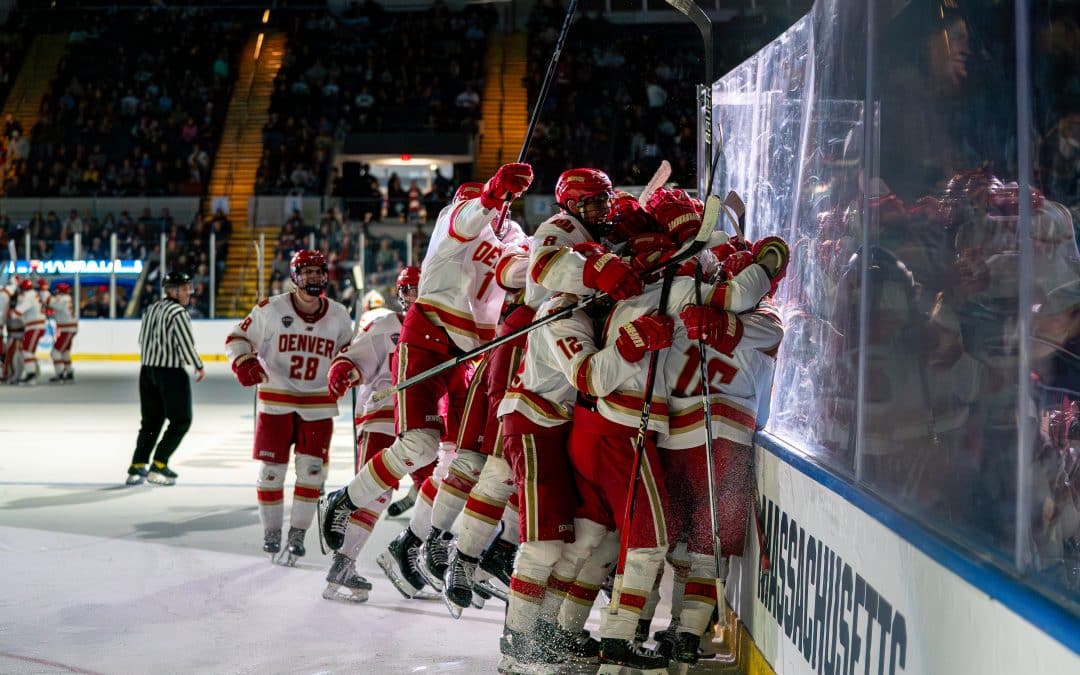Denver travelled to Springfield and clinched the Springfield regional championship with wins over UMass and Cornell. Pictured, the Pioneers celebrate their double-overtime win over the Minutemen.
Reminder Publishing photo by Joseph Derosiers
SPRINGFIELD — Springfield’s first foray into hosting a NCAA Division I hockey tournament regional provided a shot in the arm for the local economy, according to early statistical and anecdotal data.
The Greater Springfield Convention and Tourism Bureau reported the three tournament games that took place on two days — Thursday, March 28, and Saturday, March 30 — brought with them a direct economic impact of $1.1 million.
“That’s not even considering the spin-offs of indirect spending and induced spending,” said Mary Kay Wydra, president of the Greater Springfield Convention and Tourism Bureau. “$1.1 [million] is a really good number.”
Wydra explained indirect and induced spending are subsequent impacts. As an example, indirect spending includes aspects such as money earned by employees of local establishments with induced spending being the employee using those funds to purchase items or otherwise reinvest in the local economy.
“The money ripples through the economy,” Wydra said. “The $1.1 million is the number we are comfortable with right now; [the overall impact] is always higher, but we can’t say right now exactly what that is.”
Wydra also noted that occupancy impact for local hotels won’t be known until the bureau’s March report is finalized at the end of April.

Reminder Publishing photo by Joseph Derosiers
According to the NCAA, the MassMutual Center posted a two-day attendance figure of 10,172. On March 28, 5,765 hockey fans attended one or both opening round games between Denver and the University of Massachusetts Amherst, followed by the University of Maine and Cornell University. While two games were played on the first day, because they were part of a single ticketed event, the NCAA accounts for both games when tallying attendance. The MassMutual Center has a maximum capacity for hockey of approximately 6,800.
UMass and Denver kicked off the entire tournament with a 2 p.m. Thursday faceoff and treated fans to a period and a half of so-called “free hockey” as the two battled into a second overtime before the Pioneers’ Tristan Broz potted the game-winning goal for a 2-1 victory. Denver went on to defeat Cornell, 2-1, in the regional final.
Comparatively, regionals taking place at the Amica Mutual Pavilion in Providence, Rhode Island, drew 6,988 and 5,835, respectively, to see a field of top-ranked Boston College, Quinnipiac, the University of Wisconsin and Michigan Tech play on Friday, March 29, and Easter Sunday, March 31. The two New England teams — Boston College and Quinnipiac — advanced to the regional final with Boston College prevailing. In Sioux Falls, South Dakota, 5,691 and 6,113 showed up to the Denny Sanford Premier Center for a Thursday and Saturday slate featuring Boston University, Minnesota, the University of Nebraska Omaha and Rochester Institute of Technology. Boston University defeated Minnesota in that regional final.
The fourth regional was played unconventionally in the much smaller Centene Community Ice Center, a 2,500-seat arena. Typically, regional sites have a capacity of at least 5,000.
The MassMutual Center earned its first college hockey regional tournament years before, winning the opportunity through a competitive bid cycle that took place in 2019 and 2020. During that cycle, the NCAA determined its 2022-26 championship host sites.
NCAA Director for Championships and Alliances Chad Tolliver told Reminder Publishing that given the turnout and strong showing by organizers, Springfield likely earned the opportunity to host similar events in the future if it chose to enter a bid.
“There were a lot of factors involved that made Springfield a really good site for us this year. One of them was the turnout we got from the fans. I thought it was a good draw with UMass there, so there was some local flavor and the fans really showed out, which is great,” Tolliver said. “You never really know what you’re going to get; it’s kind of dependent on the teams that are placed there and geographically if their fans can show up, but I thought the fans in Springfield really showed up to the regional and it was a great first showing, if you will.”
He added that past performance is “a factor” in determining future sites in addition to facility requirements and other consideratons.
Tolliver was not on-site in Springfield but said of the reports he received from colleagues, “The report I got back was that everyone involved from the MassMutual Center to UMass to AIC, everybody was great and did a great job — particularly with it being the first one — being ready, prepared and asking all the right questions. It was a great regional all around and a lot of the local support was outstanding.”
Wydra admitted there were challenges associated with the event as well, noting it took place during Easter weekend and due to the nature of the tournament, no one knew which teams would be playing in Springfield until after conference tournament play was completed and the NCAA’s selection committee announced the field. The selection show aired on ESPN2 on the evening of Sunday, March 24.
UMass and American International College served as co-hosts for the regional. Tolliver said the host schools are “critical” to the overall execution of the regionals.
“Obviously, they’re the local experts that understand the market,” he said. “Obviously our championship staff and committee are well versed in running championship events, but not being well versed in the area, don’t have a strong sense of the way things operate and the way the market reacts.”
Host institutions also handle equipment management, athletic training and other behind-the-scenes operational aspects of the tournament.
While UMass’ involvement was a benefit in putting on the tournament, Wydra said their participation on the ice in a way put a cap on economic advantages for some industries, namely lodging.
Wydra commented, “We love that our local UMass team made it into the event; I think UMass, however, with their fanbase being hyper-local, they didn’t sell as many hotel rooms. They sold a lot of seats.”
Conversely, Denver being a significant distance from Springfield may have limited the maximum economic impact.
“The team traveled, but did their total fanbase come? Probably not,” she said. “With a sports tournament, you don’t get to pick that.”
Denver was chosen to participate in the Springfield regional due to NCAA selection committee rules. The top four teams in the tournament were Boston College, Boston University, Denver and Michigan State and, as a result, each required a top seed in of the four regional brackets. While Boston University, for example, may have been a more logical regional draw for Springfield, Tolliver confirmed that UMass earning an at-large bid into the tournament complicated that.
As a host institution, regulations stipulate that UMass was guaranteed a spot in the Springfield region and their overall seeding required them to be the fourth seed in the four-team Springfield bracket. Tolliver explained the committee has a policy of avoiding first-round match-ups between teams that play in the same conference. UMass and Boston University are both members of the Hockey East conference.
“We have some policies and procedures for championship selection standpoint that make things a little bit difficult in terms of putting the bracket together,” Tolliver said. “Because UMass had to be [in Springfield], we had to find another place for BU, so that broke up the geography a little bit more than we would have liked it, and the true seeding of the bracket, but at the end of the day, I think we ended up with some great matchups and you saw that on the ice.”
Even considering the complications, Wydra agreed the weekend was “a win, hands down, for our region.”
“It’s hundreds or thousands of people coming into the downtown and with that event taking place, they probably wouldn’t be,” she said. “Anytime we have a big gathering, it’s a win.”
Wydra said she found in polling local attractions and establishments that, anecdotally, venues outside of the MassMutual Center saw a benefit.
“[The Basketball Hall of Fame] did have a sizeable rental in their building and some other events, but they were on the lookout for hockey fans and they did have a good attendance over the weekend,” she said. “MGM also told me they saw their traffic counts were up. No hard data, but they felt like the casino floor and the bars were busy before and after games. We love hearing that. The hope is that when people come in for a sporting event, they’re also taking advantage of all the other things we have to do.”
MGM Springfield spokesperson Beth Ward referred questions related to the tournament’s impact back to Wydra and the bureau.
Downtown Springfield staple Theodores’ Booze, Blues and BBQ on March 28 shared on social media a video of its restaurant packed with people and the University of Maine band performing as its mascot danced with patrons. Reminder Publishing also noted White Lion Brewing Company’s Tower Square taproom and Nadim’s Downtown Mediterrenean Grill on Main Street among the local establishments that saw strong turnout throughout the weekend.
Tolliver also commended the management of the MassMutual Center for its role in making the weekend a success.
“The building management obviously knows how to run their building and know how to get things done. They were great to work with from our staff’s standpoint,” he said. “They really are the boots on the ground for our staff and the committee. They’re the ones that make it go there locally.”
MGM Springfield manages the MassMutual Center. Ward referred Reminder Publishing’s questions related to event management to MassMutual Center General Manager Sean Dolan, who was not immediately available for comment.
Reminder Publishing reached out to but was unable to connect with Springfield Business Improvement District Executive Director Michelle Grout.


